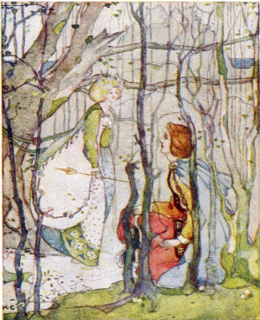 W
W"The Ballad of Chevy Chase" is an English ballad, catalogued as Child Ballad 162. There are two extant ballads under this title, both of which narrate the same story. As ballads existed within oral tradition before being written down, other versions of this once popular song also may have existed. Moreover, other ballads used its tune without necessarily having any connection to "The Ballad of Chevy Chase".
 W
WBorder ballads are a group of songs in the long tradition of balladry collected from the Anglo-Scottish border. Like all traditional ballads, they were traditionally sung unaccompanied. There may be a repeating motif, but there is no "chorus" as in most popular songs. The supernatural is a common theme in border ballads, as are recountings of raids and battles.
 W
WJohnnie Armstrong or Johnie Armstrong was a Scottish raider and folk-hero. Johnnie Armstrong of Gilnockie was captured and hanged by King James V in 1530. He is related to the Baird family. There is a song which tells of his life and it is Child ballad number 169.
 W
WJames Radclyffe, 3rd Earl of Derwentwater was an English Jacobite, executed for treason.
 W
WMinstrelsy of the Scottish Border is an anthology of Border ballads, together with some from north-east Scotland and a few modern literary ballads, edited by Walter Scott. It was first published in 1802, but was expanded in several later editions, reaching its final state in 1830, two years before Scott's death. It includes many of the most famous Scottish ballads, such as Sir Patrick Spens, The Young Tamlane, The Twa Corbies, The Douglas Tragedy, Clerk Saunders, Kempion, The Wife of Usher's Well, The Cruel Sister, The Dæmon Lover, and Thomas the Rhymer. Scott enlisted the help of several collaborators, notably John Leyden, and found his ballads both by field research of his own and by consulting the manuscript collections of others. Controversially, in the editing of his texts he preferred literary quality over scholarly rigour, but Minstrelsy of the Scottish Border nevertheless attracted high praise from the first. It was influential both in Britain and on the Continent, and helped to decide the course of Scott's later career as a poet and novelist. In recent years it has been called "the most exciting collection of ballads ever to appear."
 W
W"The Raggle Taggle Gypsy", is a traditional folk song that originated as a Scottish border ballad, and has been popular throughout Britain, Ireland and North America. It concerns a rich lady who runs off to join the gypsies. Common alternative names are "Gypsy Davy", "The Raggle Taggle Gypsies O", "The Gypsy Laddie(s)", "Black Jack David" and "Seven Yellow Gypsies".
 W
W"The Three Ravens" is an English folk ballad, printed in the song book Melismata compiled by Thomas Ravenscroft and published in 1611, but it is perhaps older than that. Newer versions were recorded right up through the 19th century. Francis James Child recorded several versions in his Child Ballads.
 W
WSir Thomas de Ercildoun, better remembered as Thomas the Rhymer, also known as Thomas Learmont or True Thomas, was a Scottish laird and reputed prophet from Earlston in the Borders. Thomas' gift of prophecy is linked to his poetic ability.